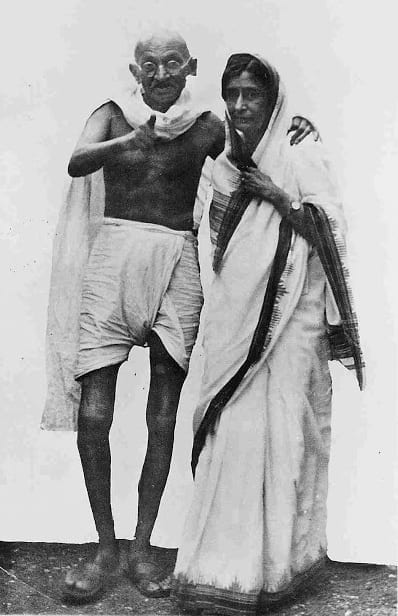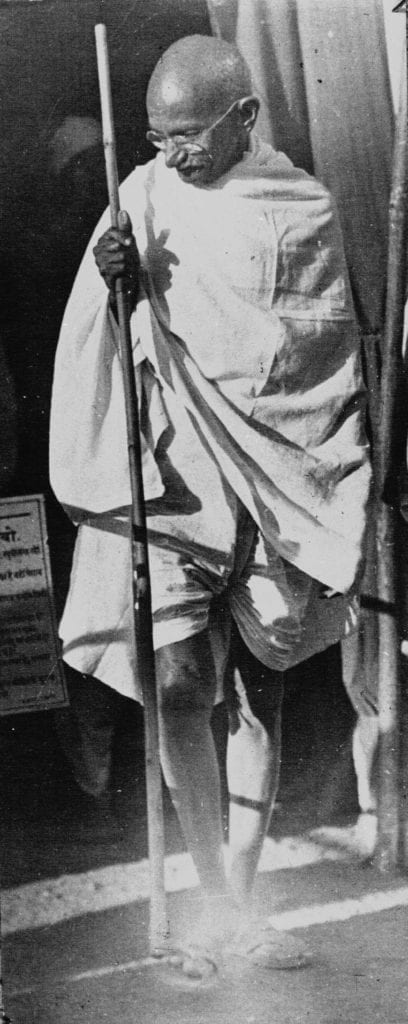Dhastagir Sheriff
Chennai, Tamil Nadu, India
In 2019, 150 years after Mahatma Gandhiji’s birth, India celebrates his birthday to honor his legacy and his contributions to the welfare of this nation. We remember him with his alluring smile, in loin cloth, shawl, and thin-framed glasses, his attire representing his message to lead a simple life. This message, simple yet difficult to follow, encouraged every Indian to respect simplicity, Indian tradition and culture, and the values taught by Indian ancestors. His teaching included instruction on manner of dress, personal health and hygiene habits, values, and making choices that reflect the nation’s true spirit.
 |
 |
 |
Indian Farmer with loin cloth, Gandhji in Loin Cloth in 2nd and 3rd Images
Gandhiji taught that Indian life was centered in villages. He said that villages were community centers that needed to be taken care of holistically: “An ideal Indian village will be so constructed as to lend itself to perfect sanitation. It will have cottages with sufficient light and ventilation built of a material obtainable within a radius of five miles of it. The village lanes and streets will be free of all avoidable dust. It will have wells according to its needs and accessible to all. It will have houses of worship for all; also a common meeting place, a village common for grazing its cattle, a co-operative dairy, primary and secondary schools in which industrial education will be the central fact, and it will have panchayats for settling disputes. It will produce its own grains, vegetables and fruit, and its own khadi. This is roughly my idea of a model village” (Harijan, 9-1-1937; Vol. 64: Pg. 217–18). He also made the point that India’s way is not the same as Europe: “India is not Calcutta and Bombay. It lives in its seven hundred villages.”
Gandhiji also professed that cleanliness was next to godliness. He wanted good sanitary practices and for people to develop a good civic sense. He said that drainage systems must never open, for it could become the breeding ground for parasitic diseases and malaria. Yet in many cities such open drainage systems still prevail and water stagnation has been the scourge of the community. Though local health authorities try to clean, build better sanitary systems, and construct toilets, still many need to be taught civic values and good social responsibility.3
“Near the village or dwellings, there should be no ditches in which water can collect. Mosquitoes do not breed where water does not stagnate. Where there are no mosquitoes, the incidence of malaria is low. At one time, water used to collect around Delhi. After the hollows were filled, mosquitoes were greatly reduced and so also was malaria.”3
He promoted community health as the basic foundation for Indian healthcare. His vision and practice laid the foundation for healthcare in India. Community health centers, district health hospitals, and medical colleges have formed a network of primary healthcare for villagers.
 |
| Open drainage and stagnation of water |
The concept of Swatch Bharat—”Keep your streets clean, build your own toilets, and take care of the reproductive health of women”—started in the ashram he built and the ashrams built for him. “We can no more gain God’s blessing with an unclean body than with an unclean mind. A clean body cannot reside in an unclean city. So long as you do not take the broom and the bucket in your hands, you cannot make your town and cities clean.”3 Those who resided in those ashrams were taught to pray in the morning, take a bath, wash their clothes, eat a simple diet, and lead a simple life. These ideas built the concept that the health of the nation is also the wealth of the nation.
He advised against spitting in the street or on the walls, a common habit in India at the time. Tuberculosis was rampant and one of the modes of transmission of the infection was through human saliva. “No one should spit or clean his nose on the streets. In some cases, the sputum is so harmful that the germs are carried from it and they inject others with tuberculosis. In some places spitting on the road is a criminal offence. Those who spit after chewing betel leaves and tobacco have no consideration for the feeling of others. Spittle, mucus from the nose should also be covered with earth.” (Navajivan, Nov 2, 1919)
He advocated for and believed in Indian naturopathy. And although he recognized the importance of women’s role in nation building and human rights, he believed strongly that sex must be for procreation and not for pleasure. “For Gandhi, all sex was lust; sex was necessary for procreation. Modern methods of birth control legitimized lust. Far better that women resist men, and men control and tame their animal passions,” wrote biographer Ramachandra Guha.4
Gandhiji’s contributions to humanity, including non-violence and ahimsa, are immense. He said, “All the alterations I have made in my course of life have been affected by momentous occasions, and they have been made after such a deep deliberation that I have hardly had to regret them.” His image and principles even today represent the ordinary citizen of the world, invoking the leaders of the nation to remember the relevance of his teaching in modern life.
References
- Ajaz Ashraf. Gandhi Jayanti: As nation prepares to mark 150 years of the Mahatma, let’s not forget his darkest hour. Wednesday, July 31, 2019.
- Ananya Barua. Becoming a Fakir: How Madurai Inspired Mahatma Gandhi’s Iconic Loincloth Attire. The Better India February 1, 2019, 12:27 pm
- Gandhi M. Ahmedabad: Navajivan Publishing House; 1948. Key to Health. Translated by, Sushila Nayyar. [Google Scholar]
- Ramachandra Guha .”Gandhi: The years that changed the world (1914-1948)”.11th Sep,2018
Image Credit
- Plough Animal India. Photo by Arun kumar. 2016. From Pixabay.
- Mahatma Gandhi with Rajkumari Amrit Kaur at Simla in 1945. Unknown Photographer. Accessed via Wikimedia Commons.
- New Delhi: Arrival of Mahatma Gandhi, who comes to meet in the Congress created by the recent convention. Meurisse News Agency. 1937. From the Gallica Library.
DHASTAGIR SULTAN SHERIFF, PhD, is a retired professor from the faculty of medicine at Benghazi University in Libya. He is now living in India and has an expertise in medical biochemistry. He is the author of a text book titled Medical Biochemistry along with five monographs and over 150 research publications. He has written this article as his token of love and gratitude to the Father of the Indian Nation, Gandhiji.

Leave a Reply